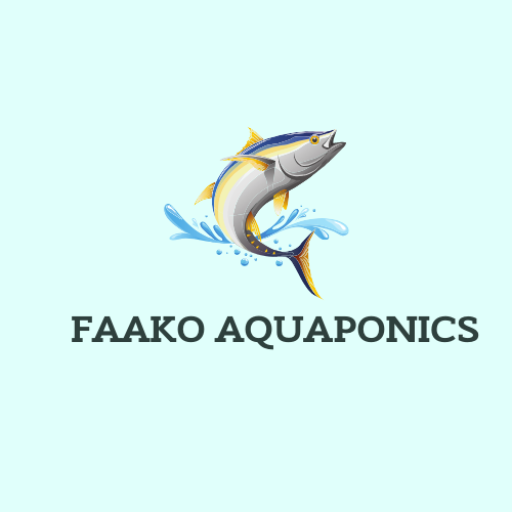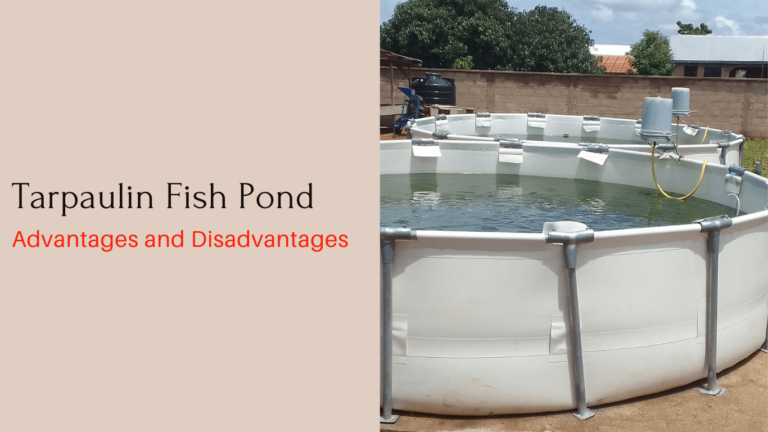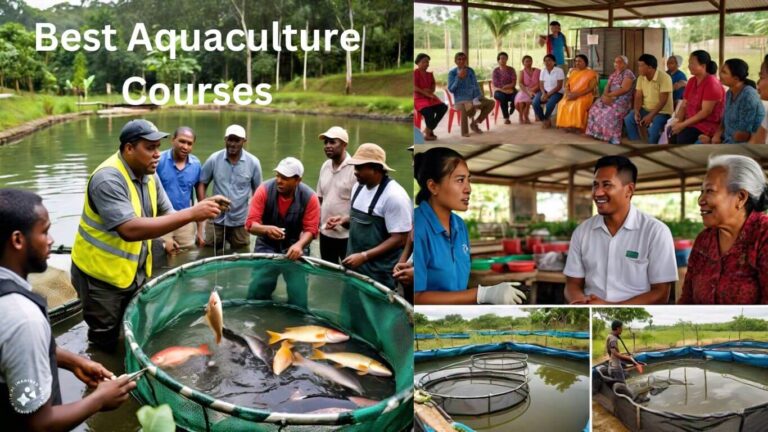Tarpaulin Fish Pond is growing in the fish farming industry for good reasons. These ponds are versatile, cost-effective, and easy to set up, making them an attractive option for both newbies and experienced fish farmers.
In this blog post, we’ll dive deep into the world of tarpaulin fish ponds, exploring their advantages and disadvantages, and providing you with all the information you need to decide if this is the right choice for your fish farming needs.
What is a Tarpaulin Fish Pond?
A tarpaulin fish pond is a large, durable, and flexible waterproof sheet used to create a pond for fish farming. These tarpaulins are usually made of high-density polyethylene (HDPE) or Polyvinyl Chloride (PVC), materials known for their strength, durability, and resistance to environmental elements.
The tarpaulin is laid out and shaped into a pond structure, often supported by a frame or simply dug into the ground. The frame can be metal, PVC pipes, bamboo sticks, wood, or anything that can support and hold the tarpaulin firm.
Key Features of Tarpaulin Fish Ponds
– Durability: Made from high-quality materials like HDPE or PVC.
– Flexibility: Can be customized to fit any size or shape.
– Portability: Easy to move and relocate if needed.
– Cost-Effective: Generally cheaper than constructing traditional concrete or earthen ponds.
Details of these features will be discussed in the advantages below.
Advantages of Tarpaulin Fish Ponds
Cost-Effective
One of the biggest advantages of tarpaulin fish ponds is their cost-effectiveness. Traditional concrete or earthen ponds can be expensive to build, requiring significant labor and materials. Tarpaulin ponds, on the other hand, are relatively inexpensive to set up and maintain. This makes them an ideal choice for small-scale farmers or those just starting out in fish farming.
So if you are starting a fish farm as a newbie and you don’t have enough budget, then start with a tarpaulin fish pond.
Easy Installation
Setting up a tarpaulin fish pond is a straightforward process that doesn’t require specialized skills or heavy machinery. You can have your pond ready in a matter of days rather than weeks or months.
This ease of installation allows you to get your fish farming operation up and running quickly.
Flexibility and Customization
Tarpaulin ponds can be customized to fit almost any size or shape, allowing you to maximize the use of your available space.
Whether you have a small backyard or a larger piece of land, you can design a pond that suits your needs perfectly.
This flexibility also extends to the ability to relocate the pond if necessary.
Maintenance and Cleaning
If you are to maintain a tarpaulin fish pond, is relatively easy compared to traditional ponds. The smooth surface of the tarpaulin makes cleaning a breeze, helping to maintain a healthy environment for your fish.
Additionally, any damage to the tarpaulin can usually be repaired with patch kits, making maintenance both simple and affordable.
Water Retention
Tarpaulin ponds are excellent at retaining water, minimizing the risk of leaks and water loss. This is particularly important in areas where water is scarce or expensive. The waterproof nature of the tarpaulin ensures that your pond retains water efficiently, reducing the need for frequent refills.
Disease Control
The ability to clean and disinfect tarpaulin ponds easily helps in controlling diseases. Traditional ponds can harbor pathogens and parasites in the soil, but the smooth surface of a tarpaulin pond reduces this risk. This leads to healthier fish and potentially higher yields.
Disadvantages of Tarpaulin Fish Ponds
Limited Lifespan
While tarpaulin ponds are durable, they do have a limited lifespan compared to more permanent structures like concrete ponds. Over time, exposure to the elements can cause wear and tear, leading to the need for replacement.
However, with proper care and maintenance, you can extend the lifespan of your tarpaulin pond significantly. I personally know a tarpaulin fish pond which is 12 years old and still working. So when I say it has a limited lifespan, it doesn’t mean it spoils that easily. But when you compare it to concrete, then you will agree with me is not durable.
Susceptibility to Damage
Tarpaulin fish ponds, while sturdy, are more susceptible to physical damage than concrete or earthen ponds. Sharp objects, heavy machinery, or even large animals can puncture or tear the tarpaulin, leading to leaks.
It’s important to take precautions to protect your pond from such risks.
Temperature Control
Tarpaulin fish pond can be more susceptible to temperature fluctuations compared to traditional ponds. The material doesn’t provide much insulation, so the water temperature can change more rapidly with the weather.
This can stress the fish, affecting their growth and health. Last week, I nearly lost my fish due to high water temperature. I drained the water to harvest the fish but was still waiting for the buyer to come. And by evening, I noticed about 3 fish dead and some very weak. So when I checked I realized the water temperature was very high. Quickly and fortunately there was another pond full of water so I transferred them to that pond. Though some died later but i was able to save some.
To mitigate this, you may need to consider additional measures like shading or partial burying of the pond. You can also install your fish pond in a greenhouse.
Aesthetic Appeal
While functionality is key, some farmers might find tarpaulin ponds less aesthetically pleasing compared to natural-looking earthen ponds.
The industrial look of a tarpaulin pond might not blend well with certain landscapes or garden designs.
However, creative landscaping and strategic placement can help improve the visual appeal.
Environmental Concerns
The materials used in tarpaulin ponds, primarily HDPE and PVC, are not biodegradable. This raises environmental concerns, particularly when it comes to disposal.
It’s important to consider the environmental impact and look for eco-friendly alternatives or recycling options when the tarpaulin reaches the end of its lifespan.
Tips for Setting Up a Tarpaulin Fish Pond
Choose the Right Location
You need to select an appropriate location for the success of your tarpaulin fish pond. Look for a flat area with good drainage and adequate sunlight. But not high sunlight that can cause excessive heat.
Avoid areas prone to flooding or high winds, as these can affect the stability and integrity of the pond.
Prepare the Ground
Ensure the ground where you’ll place the pond is free of sharp objects and debris that could puncture the tarpaulin.
You might also consider laying a protective layer, such as a geotextile fabric, underneath the tarpaulin for added protection. Because of that, I have prepared a concrete platform and installed the tarpaulin fish ponds on it. This will also give you a balance level.
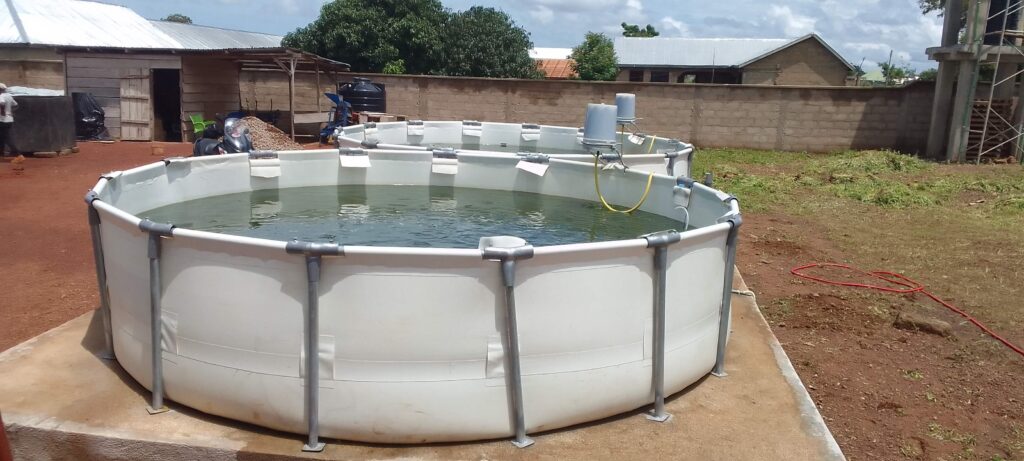
Frame and Support
Depending on the size of your pond, you may need to construct a frame to support the tarpaulin. This can be done using wood, metal, or even PVC pipes. The frame helps maintain the shape of the pond and prevents the sides from collapsing.
Fill and Maintain
Once your tarpaulin pond is set up, fill it with water and let it sit for a few days to ensure there are no leaks.
You have to monitor the water quality regularly and maintain proper filtration and aeration systems to keep your fish healthy.
If you want to add additional water quality to your tarpaulin fish pond, consider adding Recirculating Aquaculture System (RAS) and Aeration.
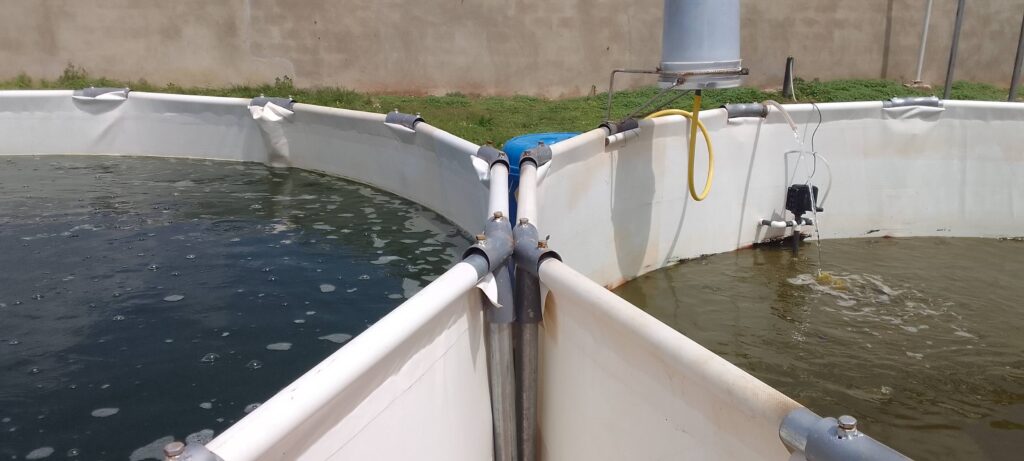
Conclusion
Tarpaulin fish pond offers a range of advantages that make it an attractive option for fish farmers. It is cost-effective, easy to install, and flexible enough to suit various needs.
However, they also come with some disadvantages, such as a limited lifespan and susceptibility to damage.
By weighing the pros and cons and following best practices for setup and maintenance, you can make an informed decision about whether a tarpaulin fish pond is right for your fish farming operation.
Whether you’re just starting out or looking to expand your existing setup, tarpaulin fish ponds can provide a practical and efficient solution for your fish farming needs.
Recommendation
To scale up your fish farm, I recommend you check out the 15 Best Aquaculture Courses to Maximize Your Fish Production. and instead of buying the materials in pieces, you can easily buy an already made tarpaulin fish pond on amazon.
